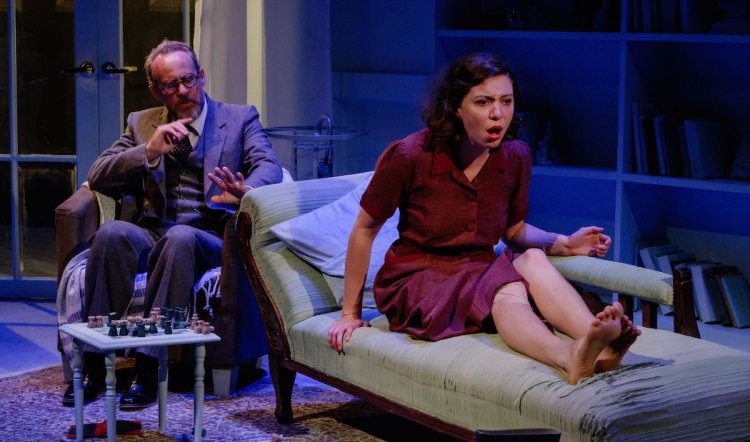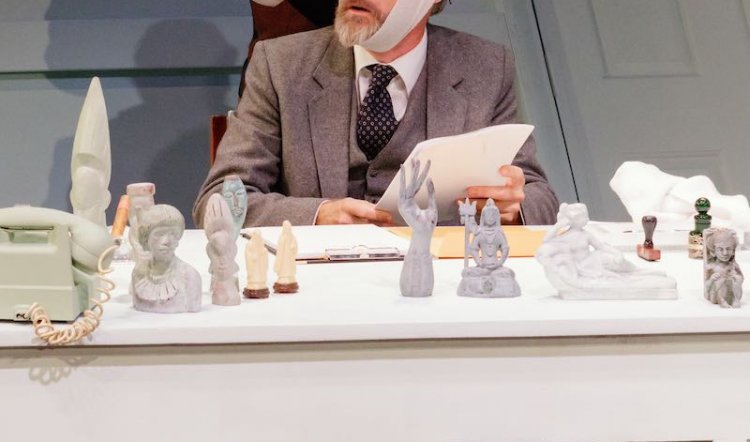
HYSTERIA
HYSTERIA, Darlinghurst Theatre Company at the Eternity Playhouse, 4-30 April 2017. Photography by Robert Catto - above: Jo Turner and Miranda Daughtry; below: Wendy Strehlow and Jo Turner
The original subtitle of English playwright and director Terry Johnson’s 1993 play is, “Or Fragments of an Analysis of an Obsessional Neurosis”. Two things happen when that’s read aloud: a melodious fragment of Pomp and Circumstance is heard in the far distance while a malodorous whiff of pretension assails the nostrils.
Hysteria is the oddest play, and few as odd as this have survived to be repeatedly revived and now be tagged (by one frothing London critic) a “modern classic”. There are more things in heaven and earth, Horatio, Than are dreamt of in your philosophy, as Hamlet said to his pal.
In essence there are two strands to this farce-drama, one fictional and one loosely based on an actual event. It might be considered rather clever that the fictional element is treated with dramatic gravitas and achieves a kind of documentary realism, while the real event is treated as farce, complete with slamming doors and humour so low and weak it attains the depressive effect of a really lousy weather system.
As he did with another well known play, Insigificance, Johnson’s central conceit is a meeting between two famous people. Insignificance had Marilyn Monroe and Albert Einstein. Hysteria has Salvador Dalí visiting Sigmund Freud in his Hampstead exile, shortly before his death. In this instance, Dalí really did go to Hampstead – for tea with the great man – but what happens is a figment of Johnson’s imagination (unless you think Freud might ever have placed an unconscious Surrealist in the all-fours buggery position in order to elicit a snigger from the audience).
Before Dalí arrives, however, in the form of much too young but valiant Michael McStay, the terminally ailing Freud (Jo Turner) is bailed up in his study one rainy night by Jessica, a young student (Miranda Daughtry). She pressgangs him into an impromptu analysis of her troubles by threatening to and then removing most of her clothing. This includes an undergarment someone else has already described as her Freudian slip, so that won’t be repeated here.
Hiding in cupboards and multiple door slams begin when Freud’s old friend Abraham Yehuda arrives. For reasons that are never clear and probably don’t matter, this elderly authority figure is played by Wendy Strehlow, a very fine actress who is entirely wasted in this ridiculous enterprise.
Because Johnson breaks the cardinal rule of farce – the more bonkers the situation, the more logically and seriously it must be played – the laughs are sporadic, few and most often chortles of polite bewilderment. This is no more apparent than in the scene where Freud tries to convince Yahuda that young Jessica is actually Dalí’s wife Gala, a Russian. (Bear with me.)

Yahuda asks Jessica where she is from and instead of doing what any sensible psychoanalyst would do and say “she’s from Russia”, Freud begins a long and elaborate mime act, behind Yahuda’s back that tells us he never played charades back in old Vienna. But wait, as the scene goes on (and on) it becomes oddly familiar. Anyone who saw Fawlty Towers Live last year will soon remember why, as will others who can recite the greatest moments of the 12 episodes of Fawlty Towers.
The Freud-mimes-Russia scene of 1993 is a straight rip-off of the Basil-mimes-Dragonfly scene of 1979 when he tried to enlist Polly’s help in hiding his betting habit from Sybil. The main difference is that nearly 40 years on, the Fawlty Towers scene is still gut-achingly funny.
At several points during the 5.5 hours that seemed to make up the 90-minute first half, I wished I were either at the dentist’s or could quietly leave or slit my wrists. Staying to the bitter end was the other choice and it did mean that Miranda Daughtry is revealed in a major scene as an emerging talent who deserves better. As already said, Michael McStay is too young to be a convincing Dalí, but in the generally absurd circumstances it hardly matters and, by golly, did he try hard.
Jo Turner makes the most of Freud and almost succeeds in anchoring the ridiculous flummery, but the continuous pivoting between docudrama and vaudeville is too much for any actor. And the less said about the non-role of Yahuda the better, unless Wendy Strehlow committed a major sin in a previous life and it’s her punishment, in which case let’s hear about it.
The thing is, however, the fictitious story – about Freud tinkering with his fabled and influential case notes in order to disguise a discovery about his father and eliminate factors in his own life that didn’t fit the bill – was genuinely interesting and full of unrealised potential, not least because the farce/fact element dominates. Director Susanna Dowling seems either out of her depth or overwhelmed by the conflicting and unresolvable demands of the play.
Frankly, when a play contains the line, “I didn’t come here for this pathetic farce,” it’s just begging to be kicked when it’s down. Bizarre. Implausible. A waste of time. A shame.



